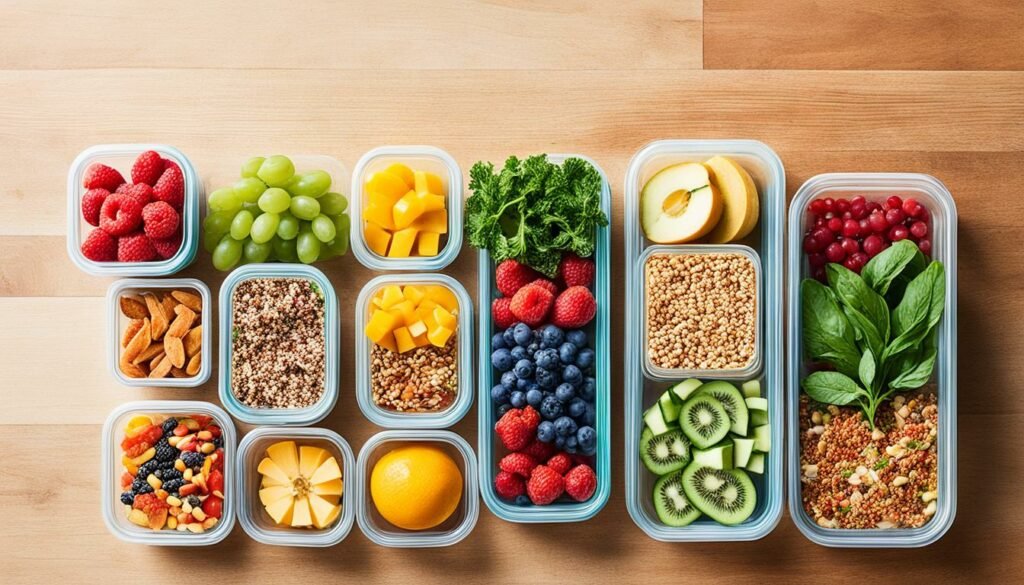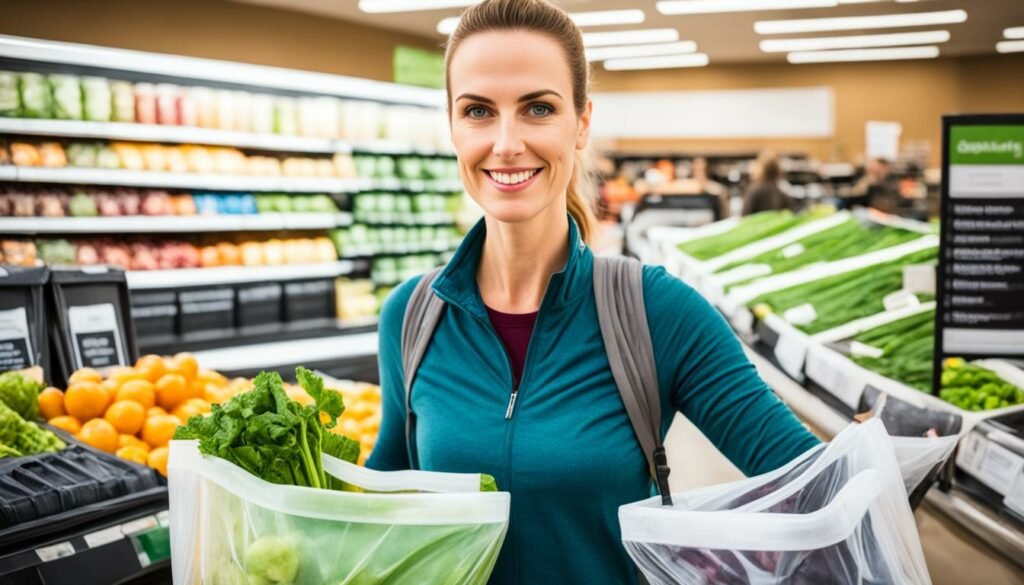The average American produces about 4.9 pounds of waste daily, amounting to over 1,800 pounds annually. This statistic underscores the critical need for adopting zero waste shopping habits. By choosing our purchases more thoughtfully, we can support sustainable consumption. This approach benefits the environment and strengthens our communities.
This guide chronicles my transition to a plastic-free lifestyle, underscoring the significance of habits that reduce waste. It transcends mere waste reduction; it’s about cultivating a sustainable culture through mindful choices and effective strategies. Let’s delve into how we can impact change, one shopping trip at a time.
Understanding the Zero Waste Philosophy
The zero waste philosophy advocates for minimizing waste throughout our consumption journey. It urges us to reassess our shopping habits and their environmental impact. By embracing this philosophy, I aim to live a lifestyle that supports eco-friendly practices. This not only protects the Earth but also fosters a sustainable economy.
What Does Zero Waste Mean?
Zero waste aims to prevent all waste from ending up in landfills by reducing, reusing, and recycling. This approach demands us to eliminate unnecessary waste from our daily lives. Viewing waste as a resource to be reclaimed, repurposed, or recycled, we support a circular economy. Products are designed for repeated use, significantly reducing harm to our planet.
The Importance of Sustainable Consumption
Embracing sustainable consumption promotes ethical practices that benefit the environment and local economies. Conscious shopping habits decrease overconsumption, aligning with the zero waste philosophy. By choosing eco-friendly and responsibly sourced products, I contribute to a healthier planet and support sustainable businesses. Sustainable consumption encourages innovation in packaging and product design, offering solutions that reduce environmental impact and improve our lives. For more information, check out this resource on zero waste practices.
Benefits of a Zero Waste Lifestyle
Embracing a zero waste lifestyle brings numerous advantages, extending beyond waste reduction. It positively impacts the environment, finances, and well-being, influencing various life aspects. Let’s explore the key benefits of this sustainable approach.
Environmental Impact
A zero waste lifestyle significantly reduces pollution and conserves natural resources. It also lowers my carbon footprint. By choosing to minimize waste, I support practices like composting and recycling. These actions help protect the environment for future generations.
Such efforts empower me, knowing my choices help maintain a healthier planet.
Financial Savings
Switching to zero waste habits leads to notable financial savings. I’ve reduced unnecessary purchases by focusing on essential items and bulk buying. This approach not only saves money but also promotes investing in durable products.
These small changes have a substantial effect on my budget, proving sustainability and savings can coexist.
Health Benefits of Eating Whole Foods
One of the best parts of a zero waste lifestyle is the focus on whole foods. Eating fresh, unprocessed ingredients offers numerous health benefits. It ensures better nutrition and less exposure to harmful additives in packaged foods.
My diet is enriched with vitamins, minerals, and fiber, enhancing overall health. Cooking with whole foods not only benefits my health but also enhances my culinary creativity.
Developing Zero Waste Shopping Habits
Adopting a zero waste lifestyle requires practical strategies that can profoundly change my shopping habits. Meal planning is crucial for enhancing efficiency and reducing waste. By planning my meals for the week, I ensure I know what to cook and use ingredients I already have. This approach minimizes food waste and saves money.
Meal Planning for Efficiency and Waste Reduction
Spending time on meal planning streamlines my grocery shopping. This approach offers several benefits:
- It reduces impulse buys, as I stick to my list.
- It encourages me to organize my pantry, making it easier to find what I need.
- It allows me to prepare meals in batches, cutting down on cook time throughout the week.
By considering my weekly events and the ingredients I already have, I significantly reduce waste. Meal planning evolves from a habit to a commitment to sustainability.
Creating a Conscious Shopping List
Alongside meal planning, a conscious shopping list is vital for achieving my zero waste goals. This list focuses on essential items for my meals, ensuring I buy only what I need. It serves several purposes:
- Prevents purchasing of unnecessary items.
- Helps avoid packaged foods that contribute to waste.
- Guides me in seeking out sustainable products.
Using a conscious shopping list strengthens my dedication to a low-waste lifestyle and improves my shopping efficiency. These strategies lay the groundwork for adopting sustainable habits in everyday life. For more eco-friendly tips, I often refer to resources like this guide on sustainable alternatives.

Shopping Strategies for a Plastic-Free Lifestyle
Adopting a plastic-free lifestyle has shown me the crucial role of shopping habits. The way I shop for food significantly impacts plastic waste reduction. By steering clear of packaged foods, opting for bulk purchases, and choosing package-free items, I aid in a healthier planet and simplify my grocery shopping.
Avoiding Packaged Foods
My key strategy is to focus on avoiding packaged foods. This approach not only decreases plastic use but often yields fresher, more flavorful ingredients. I frequent local farmers’ markets for fresh produce, reducing the need for packaging. Stores that offer unpackaged items encourage me to make choices that support my plastic-free commitment.
Utilizing Bulk Buying Opportunities
Bulk buying is a great way for me to stock up on essentials without increasing my plastic waste. I enjoy shopping at stores that let me fill my reusable containers with various items. This method reduces waste and can be more cost-effective over time. By leveraging bulk buying, I support sustainable consumption and have control over the quantities I purchase.
Finding Package-Free Products
Seeking out package-free products has become a fun challenge. I explore local grocery stores, specialty shops, and co-ops for items without excess packaging. Switching to these products allows me to select healthier, organic choices and contribute to a sustainable food system. For those looking to improve their plastic-free lifestyle, I suggest consulting this guide for tips on shopping without packaging.

| Strategy | Description | Benefits |
|---|---|---|
| Avoiding Packaged Foods | Choosing fresh items from local markets. | Reduces plastic waste, promotes health. |
| Utilizing Bulk Buying | Filling reusable containers with staple items. | Minimizes waste and saves money. |
| Finding Package-Free Products | Shopping at stores that offer unpackaged goods. | Enhances sustainability and supports local business. |
Essential Items for Your Zero Waste Grocery Trip
Preparing for a zero waste grocery trip begins with the right essentials. Using reusable containers and grocery bags helps me reduce waste. These tools aid in carrying groceries and cut down on plastic usage during shopping.
Reusable Containers and Bags
Reusable containers are a must-have for me. They come in various sizes, ideal for bulk items, snacks, and fresh produce. I also carry several durable, washable grocery bags as a substitute for single-use plastic. These tools empower me to shop sustainably and contribute to environmental protection.
Mason Jars, Cloth Bags, and More
Mason jars are essential for my zero waste shopping kit. They’re perfect for liquids and grains, adding a touch of charm to my kitchen. Cloth bags are crucial for fruits and vegetables, making eco-friendly choices easier. By preparing these items, I ensure I’m ready to reduce waste during grocery trips.


